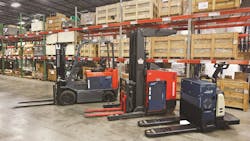Plug expands hydrogen power to European cold storage
Plug Power is expanding into Europe in a move that will see the Latham, New York-based hydrogen solutions provider supply STEF subsidiary Blue EnerFreeze with a complete green hydrogen ecosystem across two temperature-controlled distribution centers—and potentially more than 100 sites across the company’s network.
STEF is the European market leader in the transportation and logistics of food products.
“Our partnership with STEF as a pedestal customer represents a significant expansion for Plug into Europe,” Plug CEO Andy Marsh said in a news release. “We are seeing tremendous interest in hydrogen solutions in Europe. This partnership, and others coming later this year, validate Plug’s strategy to expand in the European market.”
The first two Plug Power-served distribution centers are near Paris, France, and Madrid, Spain.
Temperatures in STEF’s chilled and frozen food storage warehouses can plunge to minus-30 degrees Celsius. Under these conditions, lead acid battery-powered forklifts lose their charge quickly. Meanwhile, hydrogen fuel cells display superior performance in cold storage environments, offering higher asset utilization and increased levels of autonomy in demanding, typically multi-shift, mobility applications, Plug Power said.
The transition from lead-acid batteries to Plug’s hydrogen fuel cells will potentially improve STEF’s forklift labor productivity due to maximum power over an entire shift. Battery-powered lift trucks lose approximately 14% of their speed over the last half of the battery charge. Unique to cold storage applications, the switch to fuel cells allows operators to stay productive longer. This also means lift truck operators can continue working in the cold storage facility for a full shift, strengthening their comfort and avoiding changing of the batteries.
In parallel, fuel cell power solutions never require charging or changing. Battery changing currently requires 15 minutes per shift compared to two minutes for hydrogen refueling. Over a year, that 13 minutes saved per shift represents more than 234 hours of lost productivity per forklift truck in a three-shift operation.
Toyota will provide compatible fuel cell-ready forklift models designed and manufactured with operator comfort, productivity, and efficiency in mind for this project as part of its commitment to developing fuel cell projects across Europe.
The Paris and Madrid cold/freezer storage sites will be converted to fuel cells and are expected to be operational in the first quarter of 2024. After the success of these two sites, STEF and Plug plan to expand the use of fuel cells in STEF’s more than 100 distribution centers in Europe.
“Our expectations on these first two projects are high and aim at increasing STEF operators’ comfort and safety in a shift by avoiding battery change and improving intralogistics efficiency of our warehouses,” said Vincent Kirklar, STEF executive committee member who is leading real estate and energy activities. “In Madrid, the hydrogen will be produced on-site using power generated by our 2.9 MWp photovoltaic rooftop plant, enabling us to consume fully green and locally produced hydrogen.
“We’re proud of these projects that combine our care for people and the planet.”
